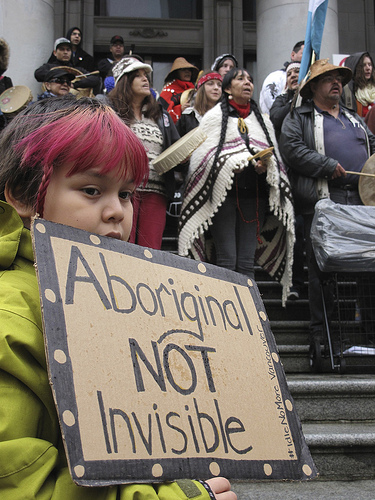One way to make a problem go away — at least temporarily — is to ignore it. It’s also the way to make problems grow over time.
For most governments, ignoring problems away isn’t easy. It requires a thick skin in the face of criticism, a disengaged electorate, a compliant media, and a lack of immediate consequences. Sadly, those four conditions exist in Canada.
In Stephen Harper’s Canada, the art of wilful ignorance has reached new heights, muzzling independent voices where they can, while attacking those who dare challenge the PMO’s control. But to dumb down the dialogue and maintain policy based solely on populist ideology, you have to go after the information sources.
Nowhere is this more obvious than policy toward First Nations. The simple fact is that in Canada, First Nations simply don’t count — aren’t counted — and each effort to reduce the evidentiary basis for policy choices only amplifies this situation.
Despite a legal duty to consult, insights from First Nations are neither sought nor welcome, as is evident at every Parliamentary committee hearing into the Harper government’s legislative suite. Non-governmental sources of information, like the Sisters in Spirit project that brought to light numbers around missing and murdered women, have lost their funding. Last year’s report of the UN Special Rapporteur on Food Security was attacked by Harper’s team and two more UN visits scheduled for later this year should anticipate the same fate. Recommendations from the Auditor General have been ignored for years, while only those experts, think tanks and academics that support the government’s line are ever referenced.
The government’s coming effort to rewrite history is hardly needed when it comes to Indigenous peoples. Canada has never faced its past honestly and openly in this regard, as hundreds of legal victories (or the name of the Indian Act) attest. Yet the Truth and Reconciliation Commission was forced to get a court order for documents that were part of its mandate to reconstruct the history around residential schools, documents that may prove to have been destroyed illegally. And we celebrate the War of 1812 while ignoring the anniversaries of the Royal Proclamation of 1763 and the Charter of Rights and Freedoms.
The release of some National Household Survey data this week and details on matters such as education and employment coming in a few months time may still yield some information of value, but over time, each successive release will be built on increasingly flimsy foundations as the quality of data diminishes. After the 2006 Census release, the government made frequent reference to numbers showing that 70 per cent of Aboriginal people live off reserve, which they believed demonstrated the increasing irrelevancy of reserves. That Métis, Inuit and non-status Indians have no more reason to be found on reserves than non-Aboriginal Canadians was convenient to blurring the definitions. The majority of those people who might live on reserve – status Indians – did and still do. But the new NHS won’t tell you that either, because it didn’t count people on 36 reserves, including several of the largest, failing to identify what is likely more than 100,000 people.
But the most telling example of how little First Nations count was the appearance by Aboriginal Affairs Minister Bernard Valcourt at a special Committee of the Whole this week. Question after question from opposition members was met by a shameless and shocking lack of concrete response. Apparently, the Minister doesn’t know how much money is spent, except in meaningless aggregates, nor does he know what results might be achieved with whatever is provided.
The reason for this is simple enough; the department doesn’t measure what matters. Spending all of its efforts on command and control form-filling and compliance coercion, Aboriginal Affairs has no idea what the per student funding is in education, how many schools and houses are needed, or which economic development initiatives produce jobs. There is no accountability for results because the Harper government cancelled the only initiative ever constructed to obtain that information in 2006, two months after coming to office.
The effort to ignore the problem, to make policy without evidence — actually in the face of contrary evidence — will not stop. The Harper government is committed to its ideological approach, Conservative voters either agree with the government’s false premises or simply don’t care, and there is little comprehension and no sustained pressure from mainstream media.
Most importantly, as far as the government is concerned, there have been no consequences to their approach. Actually, there are many, from low educational attainment to high unemployment, from floods to a lack of clean drinking water, from violence against women to suicides by children. Those are the consequences of having the wrong policy for 150 years. But the government doesn’t care.
Consequences that will make Stephen Harper pay attention have been few. Demonstrations and a hunger strike this winter forced him to hold a meeting he didn’t want to hold, hardly a significant breakthrough. A full season of peaceful and sustained action resulted in a budget where the imposition of an insulting workfare scheme was its principal investment.
Ignoring the problem has only made it grow. If First Nations are to count, there must be consequences, economic, political, or both, that the Prime Minister will have to heed. People will have to stand up to be counted in ways the federal government can no longer ignore.
Photo: by Kim Elliott, flickr.com/rabbleca



